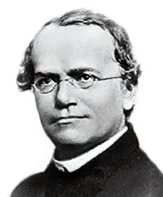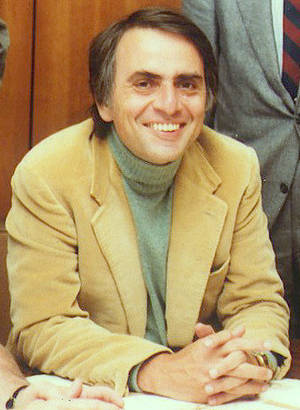When Science meets Comedy
Interview with
Robin - Bleeding heart liberal was originally going to be a more political show than it is but it started edging more and more into things about Carl Sagan and Voyager and what was put on a golden record that went through space for whatever lucky extra terrestrial would find out about it. There's some poo jokes in it and when there's not poo jokes it's probably me either talking about my favourite geneticists or astronomers. I think at the moment it's a very enthusiastic show. I think that's what I am. I'm halfway between being a self-loathing curmudgeon and an Open University lecturer who's actually eaten some mushrooms he found under the bark of a tree.
Ben - It sounds like a risk actually to talk about, as you said, your favourite geneticist. I'd imagine a lot of people don't even have a favourite geneticist.
Robin - I think part of the key to it is to, right from the start, lay out the fact that you are not smarter than the audience. You can sometimes look supercilious or superior whereas I am playing it very much from the angle that I'm not from a scientific background, I've got increasingly into science. I try and make it as silly as possible. Part of the humour is perhaps the ridiculous man jumping up and down doing nursery rhymes that were supposedly invented by Gregor Mendel.
Ben - I take it from that Mendel's your favourite geneticist?
Robin - Do you know what, they're so troublesome! You know the way that James Watson just suddenly fell out of the chart last year, whether it was justified or not? I just find I'm always fascinated by intellectual monks. Whether they're inventing tonic wines, whether they're noting moments where the moon has been struck by a small asteroid or whether they're counting wrinkles in smooth peas.
 Ben - Well that's the Mendel story. You said you mentioned your favourite astronomer. They're in the news a lot at the moment because it's the International Year of Astronomy. Who would be your pick for that?
Ben - Well that's the Mendel story. You said you mentioned your favourite astronomer. They're in the news a lot at the moment because it's the International Year of Astronomy. Who would be your pick for that?
Robin - In truth what I often do is I have a pretend top 3, of which I never reveal two of them, which allows me to constantly change my list without anyone realising, year by year. Ultimately it is probably Carl Sagan, just because Carl Sagan's my favourite scientist. I know that many people would say that his level of scientific achievement in terms of discovering a new theory or whatever it may be is not great but his zeal, his passion, the fact that he brought so many people onto science, reading his books which combine magnificent poetry with hard facts. I find I'm quite obsessed by him. Eratosthenes, I've been trying for five years to write a routine about Eratosthenes, the man who first got an approximate idea of what the circumference of the Earth was through shadows, sticks and wells. I still haven't found it. Maybe when I come to Cambridge or Norwich I shall attempt another making Eratosthenes funny routine.
Ben - Science inspires you, how are your audiences responding?
Robin - Every now and again there are some people who are a little bit confused. I was doing a gig in Bromsgrove. Because I was just sitting, waiting outside the stage door I just heard a couple go past go: "well to be quite honest I didn't quite understand quite a lot of that." It's a starting point hopefully. What I've found that is lovely is finding that people have gone out and bought books by Richard Feynman and books by  Carl Sagan and other science books off the back of seeing me tour and play music festivals. I think that people are much smarter than we imagine. For instance, when I play Reading and Leeds music festivals they said afterwards, if I was you I might dumb down for Reading. I found at Reading you can play to 3000 reasonably drunk teenagers and they will get what you're talking about. If you approach something passionately and hopefully there are some jokes in there as well they don't immediately switch off. It's not just about drinking and shagging and the things which TV seems to believe is the only thing that an audience can handle.
Carl Sagan and other science books off the back of seeing me tour and play music festivals. I think that people are much smarter than we imagine. For instance, when I play Reading and Leeds music festivals they said afterwards, if I was you I might dumb down for Reading. I found at Reading you can play to 3000 reasonably drunk teenagers and they will get what you're talking about. If you approach something passionately and hopefully there are some jokes in there as well they don't immediately switch off. It's not just about drinking and shagging and the things which TV seems to believe is the only thing that an audience can handle.
Ben - This year is also an anniversary of two hundred years since Charles Darwin was born and 150 years since the Origin of the Species was published. How does Darwin fit in your show?
Robin - I think the first time I became truly fascinated was reading an essay by Jacob Brunowski where he talks about, if you drove past down on the 3rd day of the 3rd year you'd have seen a young man playing a bassoon to a flower. It was Darwin making his son playing a bassoon to see how it affected flowers. I thought this is an interesting man. Obviously I also am a reasonably big fan of the theory of evolution. It seems like a pretty good theory to come up with. The show does end up on about 15-20 minutes about Charles Darwin, about having 20 years locked in your head - having this amazing theory - and then I can't resist a little bit about the woolly-headed nature of creationism.
 Ben - Do you think there is a movement towards more science-inspired comedy. Several of your peers: Ricky Gervais is obviously pro-science - not a lot of it makes it into his stand-up routines.
Ben - Do you think there is a movement towards more science-inspired comedy. Several of your peers: Ricky Gervais is obviously pro-science - not a lot of it makes it into his stand-up routines.
Robin - No I don't think a lot of it will make it into his new show which is titled 'Science.' There is a huge and accidental rational movement basically. I think after we put together the show 'Nine Lessons and Carols for Godless People' where we, on the science side you have Simon Singh and Ben Goldacre and Richard Dawkins and various musicians - people like Jarvis Cocker and Darren Hayman. And then comedians and all of them were doing something on the rational world. You have people like Dara O'Brian, Chris Allison, Stewart Lee and Josie Long. All of them are approaching things from a rational perspective, especially Dara who has a physics background. He's very excited about talking about science. I think the reason is perhaps because TV isn't really pandering very much to intellectual programming. I hate - that's a terrible thing to say but knowledge, learning and anything like that. There has been an accidental rational/scientific movement to start in comedy.
- Previous First Fish Sex
- Next Addicted to Laughter










Comments
Add a comment